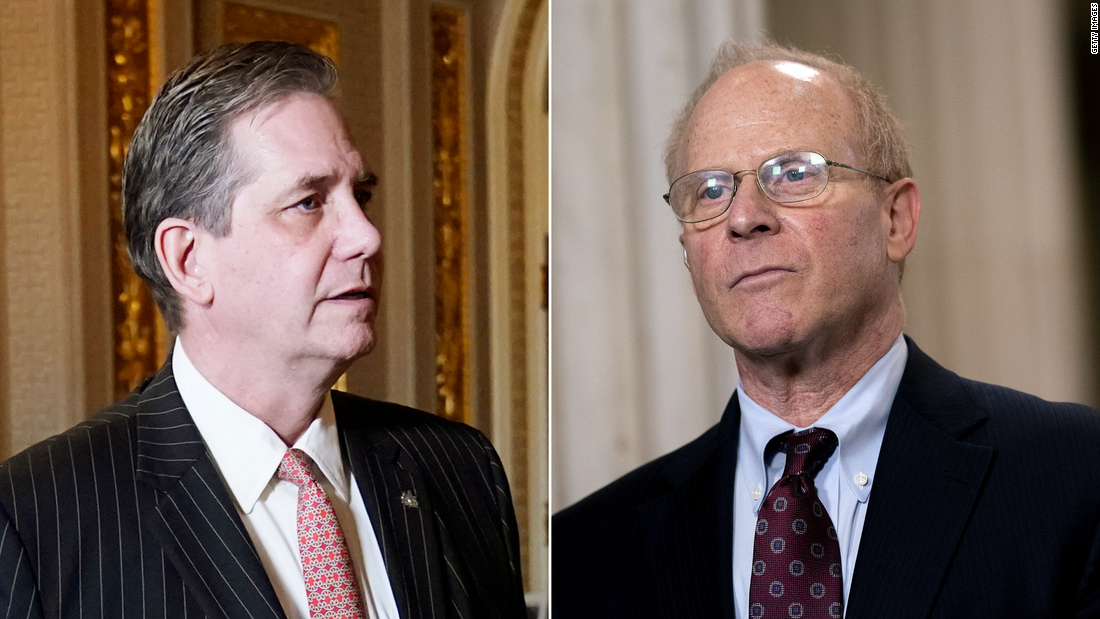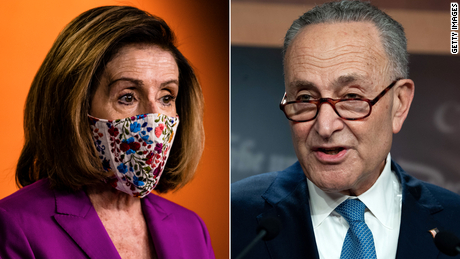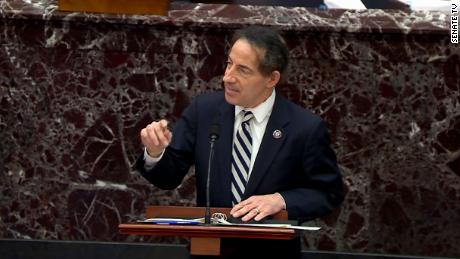Key GOP senators push Trump’s lawyers to explain ex-President’s actions as Pence was endangered
During the Senate questions, the key Republicans who could vote to find Trump guilty focused on the actions of the then-President as the riot unfolded and then-Vice President Mike Pence was endangered, a topic that Trump’s lawyers did little to address during their argument or when the GOP senators posed the questions.
The defense team’s presentation showed Democratic reactions to videos of protests and riots over police violence last year, comparing them to the attack on the US Capitol, while they argued that Trump’s language telling his supporters to “fight like hell” was merely “ordinary political rhetoric.” Trump’s lawyers also falsely suggested Antifa was responsible for the deadly riots, rather than Trump supporters, and raised Trump’s false claims of voter fraud in Georgia.
The presentation underscored the goal of Trump’s team Friday: Do no harm. Unlike the Democratic managers, who hoped to win over Republican senators with their presentation, Trump’s lawyers expect to already have the votes they need for acquittal, as most Republican senators are saying they will vote to acquit Trump because they believe the trial is unconstitutional.
Democratic senators told CNN they expect the final vote to convict Trump could happen at 3 p.m. ET, with the Senate expecting to reconvene the trial at 10 a.m. ET on Saturday, although the vote time is not yet locked in. Senators have up to four hours for the question-and-answer session, and the Senate will wrap for the day once that’s completed. Senators don’t expect to use the full four hours, though there’s no way of estimating what time questions will be done because any senator can decide to ask a question on the floor on the fly as long as it’s within the four-hour time period.
During their two days of arguments, the House managers tried to force senators to confront the horrific images in a bid to change Republican minds, while Trump’s team was more than content with a partisan draw. At the first break of the day Friday, the partisan division was on display in a way it had not been in the two days when the managers presented: Republicans praised Trump’s lawyers and Democrats universally panned them.
Questions focus on Trump’s response
After three days of mostly scripted presentations, the question-and-answer session was more free-flowing, although the House managers and Trump’s lawyers were clearly prepared for the friendly questions they received from senators.
The questions, alternating between Democrats and Republicans, were submitted on a notecard to Sen. Patrick Leahy, the presiding officer as Senate president pro tem, and they were read by the Senate clerk.
Democrats’ questions to the managers and most GOP questions to the President’s team were intended to help bolster their respective cases. There were a few exceptions, such as when independent Sen. Bernie Sanders of Vermont asked both sides whether Trump had won the election as he falsely claimed.
But the most interesting questions came from some of the handful of Republican senators open to conviction: Sens. Susan Collins of Maine, Lisa Murkowski of Alaska, Mitt Romney of Utah and Bill Cassidy of Louisiana.
Collins and Murkowski jointly asked Trump’s legal team to describe when he had learned of the riots and the actions he had taken. They asked the lawyers to be as specific as possible, but Trump attorney Michael van der Veen said only that Trump had tweeted at 2:38 p.m. ET before the lawyer launched into an attack against the House Democrats for what he called lack of due process.
Romney asked both sides whether Trump had known that Pence was in danger when he criticized his vice president in a tweet at 2:24 p.m. while Pence was being evacuated from the Senate.
“The answer is no,” van der Veen responded.
Later, Cassidy asked about Trump’s tweet and the conversation Sen. Tommy Tuberville of Alabama had had with Trump minutes beforehand, in which, Tuberville said this week, he had told Trump the vice president was being evacuated.
Cassidy said Trump’s tweet “suggested President Trump did not care that Vice President Pence was in danger,” asking whether it showed Trump was tolerant of intimidation of Pence.
Van der Veen said the answer was no but that he disputed the facts underlying the question, even though Tuberville’s description of the call was recounted on the record to reporters this week.
Raskin, whose family members were trapped in the Capitol during last month’s riot, later responded to van der Veen, “For that I guess we’re sorry, but man, you should have been here on January 6.”
A divided reaction
During the defense presentation, van der Veen played clips of congressional Democrats objecting to the certification of Trump’s win in the 2016 election, including Raskin. And they ran a nearly 10-minute montage of Senate Democrats, the managers and other politicians saying the word “fight,” suggesting they used the same rhetoric as the former President.
Trump’s lawyers also went after House Democrats, accusing them of political retribution in impeaching the former President a second time after going after him throughout his time in office. They accused the managers of selectively editing footage of Trump’s speeches and tweets and ignoring Trump’s comments for protesters to remain peaceful.
“The hatred that the House managers and others on the left have for President Trump has driven them to skip the basic elements of due process and fairness,” Trump attorney David Schoen said.
Inside the Senate chamber, Republicans reacted with chuckles and laughter at various points, nodding in agreement with the Trump lawyers’ presentation. Democrats were mostly stone faced at the start of the lengthy montage, but that changed quickly as more and more clips played. There were constant murmurs in the chamber, as well as whispering, some laughing and note passing.
Republicans had panned the initial meandering presentation from Trump’s team on Tuesday, but they praised his attorneys on Friday.
“I just think the President’s attorneys just blew their case out of the water,” said Sen. Ron Johnson, a Wisconsin Republican.
Sen. Lisa Murkowski, an Alaska Republican who voted the trial was constitutional, said Trump’s team was “putting on a good defense today.”
“The first two hours I thought were well put together,” she said.
To Democrats, the Trump lawyers put forward a “bogus argument,” said Sen. Tim Kaine, a Virginia Democrat. “Donald Trump was told that if he didn’t stop lying about the election people would be killed. He wouldn’t stop, and the Capitol was attacked and seven people are dead who would be alive today. That’s what I think about this,” he said.
Sen. Martin Heinrich of New Mexico called it a “completely false equivalence.”
“I don’t remember any violent mobs after any of those comments, so it’s just not the same thing,” Heinrich said.
‘Peacefully and patriotically’
Van der Veen acknowledged the abhorrent violence at the Capitol on Friday, but also suggested that groups of “extremists of various different stripes and political persuasions,” including Antifa, pre-planned the attack, meaning Trump could not have incited it.
“Nothing in the text could ever be construed as encouraging, condoning or enticing unlawful activity of any kind,” van der Veen said. “Far from promoting insurrection against the United States, the President’s remarks explicitly encouraged those in attendance to exercise their rights peacefully and patriotically.”
A top FBI official told reporters in early January that they had seen “no indication” that Antifa members had disguised themselves as Trump supporters. Even House Minority Leader Kevin McCarthy, a California Republican, said on the House floor last month during the impeachment debate there was “absolutely no evidence” Antifa caused the riots.
The defense team’s focus on Trump’s January 6 speech also ignored the argument House Democrats had made earlier in the week that Trump’s incitement dated back months and involved more than just that speech.
The most substantive case Trump’s lawyers made was that Trump’s speech on January 6 did not amount to incitement and was protected by the First Amendment, just like other political speech is protected speech. Trump’s team argued that he used the word “fight” in a political context at his speech at the January 6 rally, such as fighting Republicans who voted against him in a primary.
“There’s no doubt Mr. Trump engaged in constitutionally protected speech that the House has improperly characterized as incitement of insurrection,” said Trump attorney Bruce Castor.
The Trump team’s presentation concluded with an effort to push back on the allegations that Trump told Georgia Secretary of State Brad Raffensperger to “find” enough votes for Trump to win, as Castor raised many of the false allegations about voter fraud in Georgia to argue Trump had done nothing wrong when he called Raffensperger.
This story and headline have been updated with additional developments Friday.
CNN’s Clare Foran contributed to this report.
![]()






